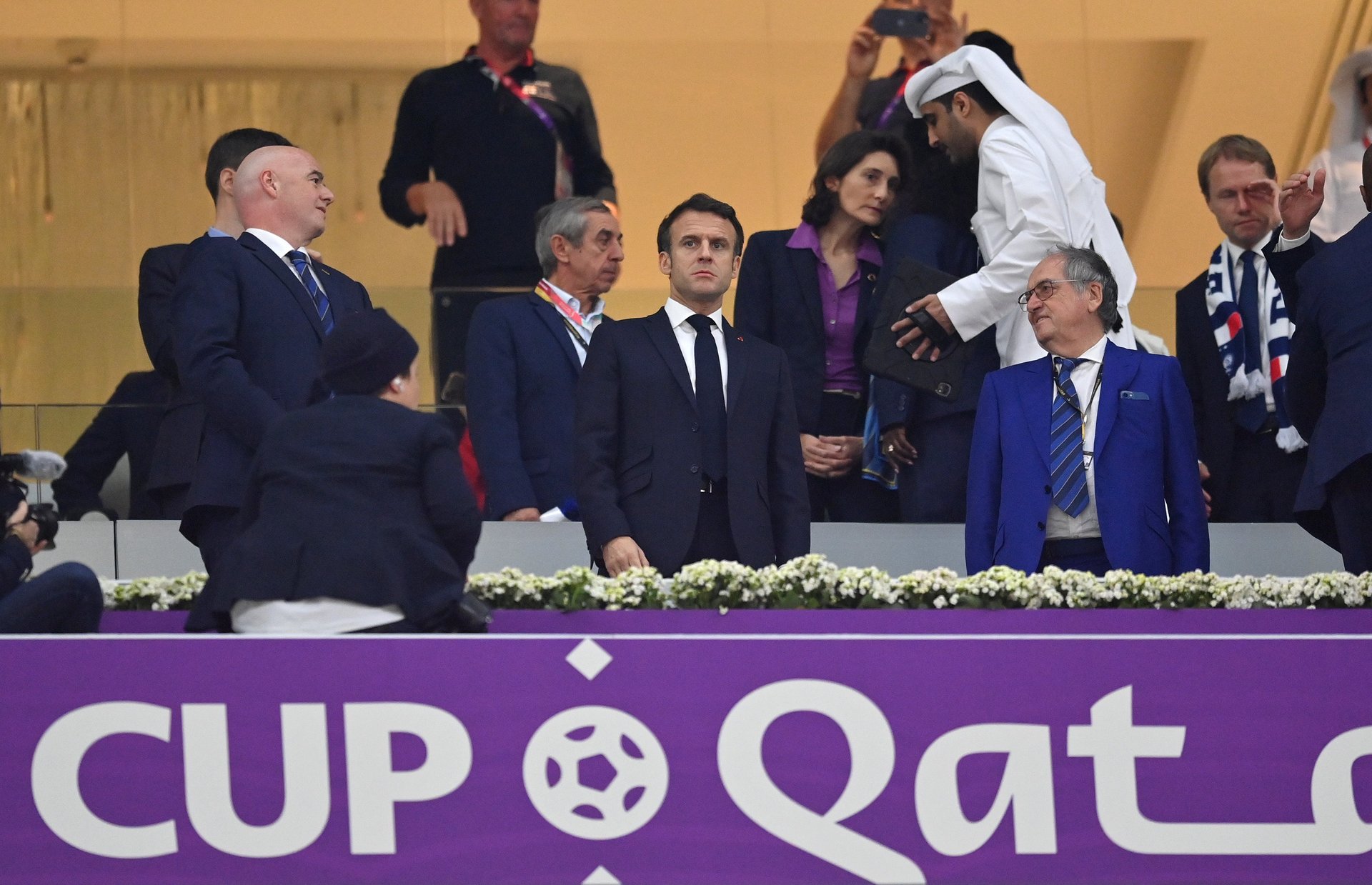The World Cup final is refocusing the spotlight on Qatar's soccer investments in France
Macron's trip to the Gulf state for the final match of the controversial tournament comes at an awkward time

French president Emmanuel Macron plans to make a second trip to Qatar this week to support his national soccer team in its final game against Argentina on Sunday (Dec. 18). The timing isn’t ideal, awkwardly coinciding with the eruption of a growing corruption scandal related to the Gulf state’s alleged bribery of European lawmakers that saw the arrest of the now former vice president of the European Parliament, Eva Kaili. Macron is rejecting calls to cancel the trip, despite mounting criticism and scrutiny of Qatar’s ties to Europe’s political sphere.
Suggested Reading
The recent history of Qatar and France’s relations isn’t scandal-free, either, particularly when it comes to the business of soccer. Former president Nicolas Sarkozy has long been accused of having lobbied for Qatar’s 2022 World Cup bid in exchange for a range of favors, including the purchase of French fighter jets and of the soccer club Paris Saint-Germain (PSG), of which he’s a supporter—Sarkozy has claimed he didn’t have the power to influence the vote.
Related Content
Qatar counts as the fourth-most visited country by French lawmakers, with the trips usually funded directly by the Qatari royal family, and it has invested heavily in various projects involving France, including a $318 million fund to support French small businesses and a $470 million deal with a Japanese and French joint venture to build a solar energy plant.
It doesn’t help the optics that two of the star players of the World Cup final, Argentina’s Lionel Messi and France’s Kylian Mbappé, both play for PSG. The team has been owned since 2011 by Qatar Sports Investments, a subsidiary of the Qatar Investment Authority, and counts Qatar’s flagship airline as a prominent sponsor.
Macron expressed an interest in PSG’s fortunes last year when he weighed in on the club’s recent attempts to re-sign Mbappé. The club did re-sign the marquee player, offering him what’s rumored to be the sport’s largest player contract ever. And his PSG teammates, Messi and Neymar Jr., has respectively signed the second and third-largest deals in soccer history, bringing the Qatari-owned club to a record-setting $425 million annual payroll, a testament to the county’s exorbitant investments in French soccer.
The fallout of Qatar’s World Cup bid
December 2010: Qatar is awarded the 2022 World Cup over rival bids from Australia, Japan, and the United States.
May 2011: Suspended FIFA vice-president Jack Warner leaks an email from the organization’s general secretary, claiming Qatar “bought” the rights to host the World Cup. Later that month, FIFA whistleblower Phaedra al-Majid claims that Qatar paid $1.5 million to African Football Confederation executives in return for their support.
September 2013: The Guardian publishes an investigation comparing the treatment of Nepalese laborers building the Qatari World Cup stadiums to modern-day slavery.
March 2014: An investigation by The Telegraph reveals that Warner and his family were paid approximately $2 million by a firm linked to Qatar’s World Cup campaign.
February 2015: The 2022 tournament is moved to November/December due to concerns over extreme heat during Qatar’s summer months.
June 2015: Switzerland arrests seven FIFA officials on bribery and money laundering charges brought by the US. FIFA president Sepp Blatter resigns six days later.
April 2020: The US Department of Justice accuses representatives from both Russia and Qatar of bribing FIFA officials in support of their 2018 and 2022 bids.
August 2020: Qatar abolishes its controversial Kafala system for hiring foreign labor and implements a monthly minimum wage.
November 2021: Blatter is formally charged by Swiss authorities for charges of fraud and improper payments to former French player Michel Platini, a former UEFA president and a key figure in European support for Qatar’s bid. Blatter is cleared eight months later.
November 2022: The World Cup begins in Qatar.
The French dispatch: Sarkozy’s chronicled corruption
Sepp Blatter, the disgraced former president of FIFA, last month doubled down on his accusations that Sarkozy lobbied for Qatar’s World Cup bid on behalf of the country’s Crown Prince as part of a larger deal between the two leaders.
According to Blatter, FIFA was poised to have the US host the tournament but changed course when Platini approached him on behalf of Sarkozy and asked him to give it to Qatar instead—Platini has maintained he wasn’t directly asked, but that he understood that was Sarkozy’s preferred course of action. Blatter pointed to the $14.6 billion dollar sale of French fighter jets to the Qatari military six months later as evidence of a quid pro quo agreement.
Sarkozy was convicted of corruption in 2021 in two separate criminal trials relating to improper campaign contributions, and sentenced to three years in prison, two of which were suspended. Sarkozy is yet to serve any time in prison, with the results of an appeal expected soon.
Sarkozy is also on the hook for a separate corruption case. French investigators charged the former president in 2020 with “membership in a criminal conspiracy” after accusations that former Libyan leader Muammar Gaddafi bankrolled Sarkozy’s first presidential run in 2007 to the tune of €50 million. The claims were first made by Gaddafi’s son after Sarkozy opted to recognize the rebel government in the 2011 Libyan Civil War. The criminal investigation is still ongoing.